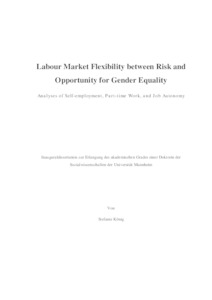|
Labour market flexibility between risk and opportunity for gender equality analyses of self-employment, part-time work, and job autonomy
König, Stefanie
![[img]](https://madoc.bib.uni-mannheim.de/40566/1.hassmallThumbnailVersion/Dissertation_SKoenig_MADOC.pdf)  Vorschau |
|
PDF
Dissertation_SKoenig_MADOC.pdf
- Veröffentlichte Version
Download (8MB)
|
|
URL:
|
https://madoc.bib.uni-mannheim.de/40566
|
|
URN:
|
urn:nbn:de:bsz:180-madoc-405666
|
|
Dokumenttyp:
|
Dissertation
|
|
Erscheinungsjahr:
|
2016
|
|
Ort der Veröffentlichung:
|
Mannheim
|
|
Hochschule:
|
Universität Mannheim
|
|
Gutachter:
|
Ebbinghaus, Bernhard
|
|
Datum der mündl. Prüfung:
|
22 Januar 2016
|
|
Sprache der Veröffentlichung:
|
Englisch
|
|
Einrichtung:
|
Fakultät für Sozialwissenschaften > Soziologie III, Makrosoziologie (Ebbinghaus 2004-2016)
|
|
Fachgebiet:
|
300 Sozialwissenschaften, Soziologie, Anthropologie
|
|
Normierte Schlagwörter (SWD):
|
Arbeitsmarkt , Soziale Ungleichheit , Geschlechterunterschied , Teilzeitbeschäftigung , Selbstständigkeit , Deutschland , Schweden , Dänemark
|
|
Freie Schlagwörter (Englisch):
|
labour market , gender , flexibility , self-employment , part-time work , housework , work-life conflict , earnings , retirement , Germany , Sweden , Denmark
|
|
Abstract:
|
The dissertation “Labour Market Flexibility between Risk and Opportunity for Gender Equality – Analyses of Self-employment, Part-time Work, and Job Autonomy” addresses the main research question: Is flexibility the key to a less gendered labour market, or does it rather foster more traditional roles and gender inequality? In four empirical studies, different aspects in life were investigated in order to gain a holistic understanding of gender inequalities related to flexibility at work: the division of housework between couples, the work-life conflict, gender earning gaps and the transition to retirement. Going beyond previous research on gender inequalities at the labour market which often concentrated on part-time work, this dissertation expands the investigation to three different forms of flexibility. Besides part-time work, self-employment and working time flexibility are researched in a comparative fashion to get a multifaceted view on gender issues with regard to flexibilization of labour markets. Results were interpreted taking the institutional context in Germany into account, partly in direct comparison to other countries. Five main conclusions can be drawn: (1) Work flexibility might be a necessary tool for better outcomes in one field, while it simultaneously limits successful outcomes in another field. To give an example, while part-time work is related to a lower work-life conflict, it is also strongly related to lower earnings. (2) Different forms of flexibility are related to contrary results. While self-employment is related to low gender gaps at the top of the earning distribution, part-time work is related to high gaps at the top. (3) Even the same form of flexibility can be related to higher and lower gender inequality with regard to one outcome depending on different subgroups of individuals. While self-employment can be a chance for high earnings to some women, most self-employed women have rather low earnings. (4) The same form of flexibility can be related to different outcomes for men and women. While autonomy at work is related to less housework for men, this is not the case for women, which leads to significant gender difference. (5) Flexible work can have opposing outcomes in different countries. Long part-time periods are related to later retirement in Sweden but earlier exits in Denmark. Depending on the pension system, part-time work might lead to high accumulated losses and a need to continue working in one country but not in others.
|
 | Dieser Eintrag ist Teil der Universitätsbibliographie. |
 | Das Dokument wird vom Publikationsserver der Universitätsbibliothek Mannheim bereitgestellt. |
 Suche Autoren in Suche Autoren in
Sie haben einen Fehler gefunden? Teilen Sie uns Ihren Korrekturwunsch bitte hier mit: E-Mail
Actions (login required)
 |
Eintrag anzeigen |
|
